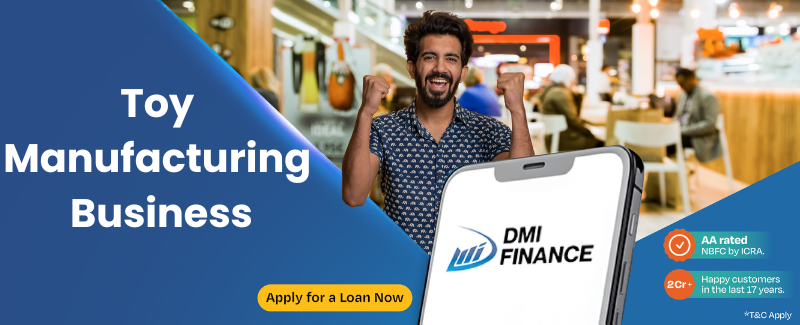- Published on: 21 Nov 2025
- Last updated on: 27 Jan 2026
- Post Views: 2447


Toys have always been a joyful and memorable part of our lives. As an entrepreneur, starting a toy manufacturing business in India gives you the opportunity to share that joy with the next generation of kids and build a profitable business. India, in that regard, has a rich history of creating toys from clay, wood, and now plastic and tech.
While the domestic demand is at an all-time high, the DPIIT Toy Industry Report states that the toy exports rose by 239%, showing there is a global demand, as well. In this blog, we will understand how to launch a toy business startup in India.

Toys are an important part of Indian heritage, culture, and tradition. Its roots go back to the Indus Valley, Harappa, and Mohenjo-Daro. A few examples of the most popular games are Chaturanga, known as modern-day chess, and Pachisi, known as ludo.
As with the world, the toy industry has evolved, as well. From clay to tech toys, the industry has come a long way and is now valued at ₹16,849 crore, and it is forecasted to reach 41,679 crore by 2033.
There was an identity crisis in the Indian toy market, but it is now fading. Imported plastic toys once dominated the market. Due to increased trust in Indian brands, stricter import regulations, and quality improvements, local manufacturers are now gaining market share. The industry witnessed a 52% decline in imports and a 239% rise in exports.
The creative side of making toys is always fun, but when it comes to compliance, most new manufacturers struggle. India’s toy industry is heavily regulated for safety. The Bureau of Indian Standards (BIS) is the primary authority that regulates toy quality in India.
In practice, getting BIS certification means submitting product samples for lab testing, preparing your facility for inspection, and proving that materials, paints, and mechanical parts meet specific safety benchmarks. It can take a few weeks or a few months, depending on readiness.

A key benefit of starting a toy manufacturing business is that it offers a high profit margin of up to 25%. However, you will first need to invest between ₹5 lakh to ₹20 lakh to start the toy manufacturing business. Here are the key expenses involved in launching a toy business startup:
Tip: The actual cost of starting a toy manufacturing business depends on the scale and complexity of the business. Based on the scale and complexity, the investment required can go as high as ₹50 lakh to ₹1 crore.
Here is how you can start toy manufacturing in India:
Step 1: Conduct Market Research
You must start by conducting a deep market research, about demand, supply, pricing, competitors and more. Research demand patterns, age groups, and types of toys that are in demand. Once you find the gap, you can choose the right products and set competitive pricing.
Step 2: Select Your Business Model
Next, decide whether you want to produce toys in-house or prepare and label them. You must also decide how you are going to sell them, online, in the market or both. Small manufacturers can start with an investment of ₹5-₹20 lakh.
Step 3: Register Your Business
Create a complete working business plan with appropriate capital requirements, projected margins, and risk assumptions. Also, decide on a legal structure of a business like LLP, Pvt Ltd, proprietorship, then apply for registration under GST, and if eligible, also apply for MSME. You must register your business and comply with:
Step 4. Location and Setup
Location plays a crucial role in setting up a toy manufacturing business. You must choose a location that is accessible, within reach, cost-effective and well-connected to suppliers, markets and transport facilities. It must also be easily accessible to staff and workers.
Step 5: Establish Production Facility
The next step is purchasing the right equipment that matches your material type. In the early phase of business, start with one or two production lines. Select an industrial region or MSME toy cluster. Buy or lease land and install machinery, including:
Step 6: Procure Raw Materials
Choose quality materials for your toys from plastic granules, wood, cloth, paints, and fittings. Ensure that materials are non-toxic, free of toxic chemicals, and BIS tested. You must also hire skilled employees for designing, moulding, finishing and packaging.
Step 7: Testing and Quality Control
Test toys in BIS-approved laboratories for:
Step 8: Branding, Marketing and Sales
Develop a safety and innovation-based brand identity. Besides partnering with local distributors, register on E-commerce platforms like Amazon, Flipkart, or the Government e-Marketplace (GeM) for bulk orders. For setting up brand & market entry, design the packaging with clear age labels and safety notes.
Once business is running smoothly and domestic demand has become stable, start exploring export markets through trade fairs and industry councils. Indian standards now also align with global benchmarks, which eases cross-border entry.

The Government of India assists the toy manufacturers with the help of several schemes that are directed to local production, innovation, and export.
Marketing is crucial in the toy manufacturing business. Here are the effective marketing strategies you can follow:
Here are the key risks associated with toy manufacturing in India:

The toy manufacturing industry in India is already witnessing strong policy support from the government. There is also a growing export demand, making it the best time to pursue different toy manufacturing ideas. It not only helps you start a profitable business but also offers the right environment for expansion.
Scaling and expanding your business, however, requires funds, and hence the financing. At DMI Finance, we offer a collateral-free business loan to help you grow and expand your business. Apply for a business loan of up to ₹25 to steer your business towards growth and success.
1. What is the minimum investment required to set up a toy manufacturing business?
The minimum requirement for a small unit ranges between ₹5 lakh and ₹20 lakh. However, it can go as high as up to ₹2 crore based on the scale and size of the business.
2. Is BIS certification mandatory or optional?
For selling toys in India, BIS Certification is mandatory under the DPIIT order.
3. How long does BIS certification take?
The BIS certification will take anywhere from a few weeks to a few months, depending on readiness.
4. Which categories of toys are growing fastest?
Currently, STEM-based, educational, and sustainable toys are the fastest-growing categories of toys in India.
5. Can small toy manufacturers export?
Yes, you can export, provided that the quality and documentation meet the international norms.
6. What are the typical cost heads in the toy industry in India?
The typical cost head consists of factory setup, machinery, raw materials, testing, wages, and marketing-related expenses.
7. How to choose the right product line?
To choose the right product line, focus on one niche like wooden, plastic, or educational, based on skill and capital.
8. Why is packaging so important for toys?
Packaging is important because it communicates safety, quality, and brand identity to parents and retailers.
9. Are government subsidies available for starting a toy business?
Yes, MSME and state policies often provide capital and power-tariff incentives. You can check the Startup India and DPIIT portal.
10. What are the top toy manufacturing ideas?
Here are the top manufacturing ideas you can pursue this year:
Disclaimer: The business ideas shared in this blog are based on research and trends. DMI Finance does not recommend or guarantee it. Starting a business involves risk—please use your own judgment and discretion. DMI Finance is not liable for any loss or outcome resulting from actions taken based on this content.


